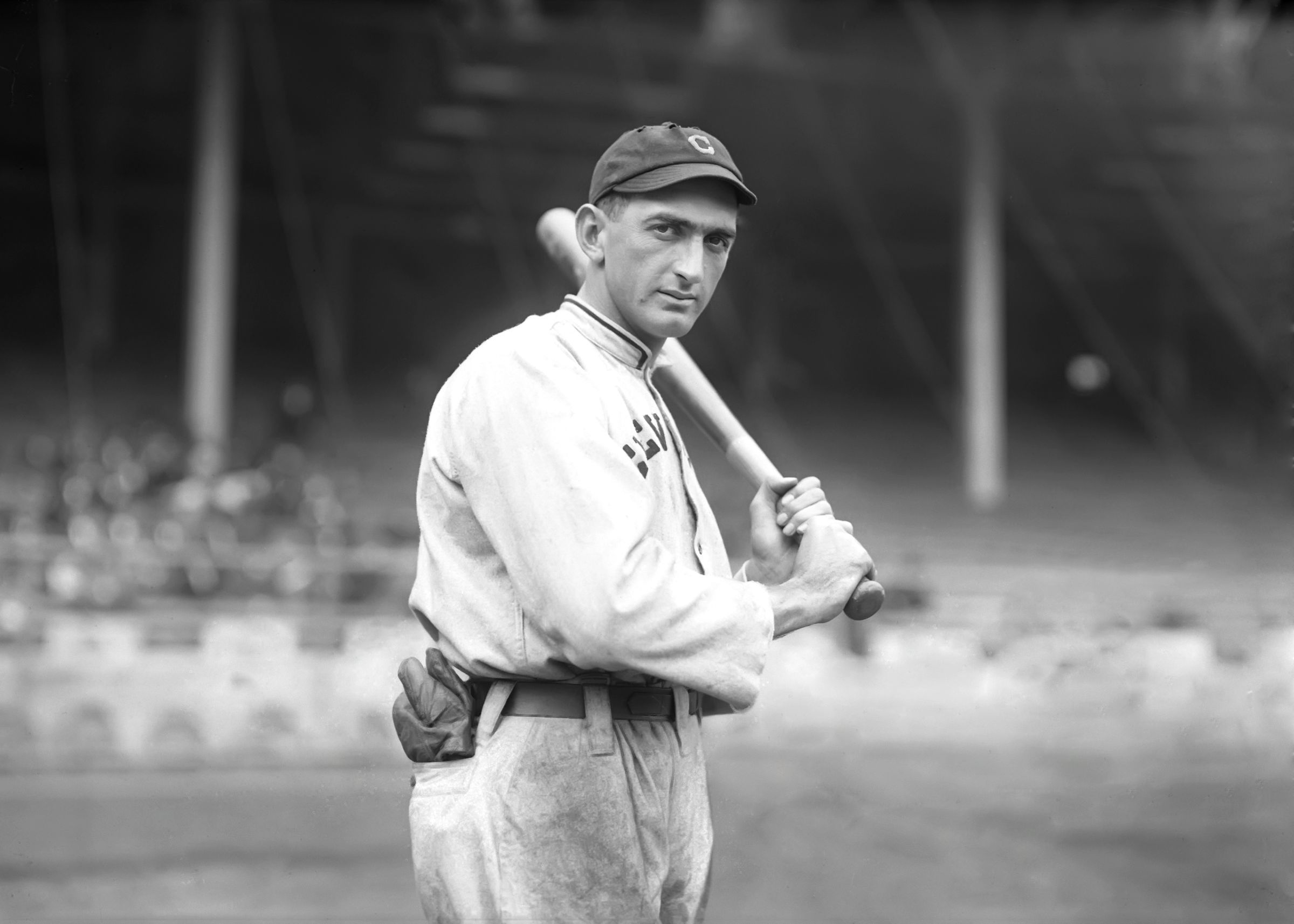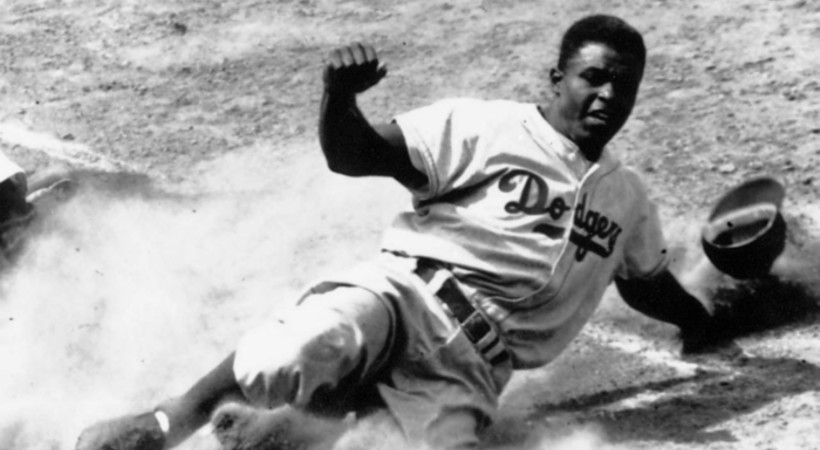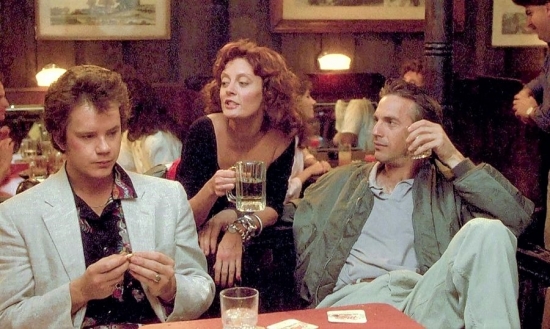Index
Last At-Bats
Nearly nine decades of baseball movies are represented in this evaluation, illustrating the evolution of both the sport and the cinematic depictions of same, whether docudramas of actual events or personalities, fictional movies inspired by actual events or personalities, or pure fiction simply inspired by baseball's rich history and even more colorful characters.
Of the thirty movies profiled here, the first of which was released in 1932, two themes emerge as the most salient. One is the stigma of gambling, epitomized by the "Black Sox" scandal during 1919 World Series, that continued to haunt baseball for decades afterward. Certainly, it haunted sports writer Ring Lardner, a witness to the scandal when it began to unfold, whose stories yielded three movies starring Joe E. Brown (Fireman, Save My Child; Elmer, the Great; Alibi Ike) in which each of Brown's various talented if naïve players are tempted by shady characters trying to corrupt him.
The real-life analog to Brown's characters (and given Brown's broad comedic approach, they were all characters) is Shoeless Joe Jackson, the White Sox outfielder who would be (pardon the expression) a shoo-in for the Baseball Hall of Fame were he not subjected to a lifetime ban from baseball.
A lasting if checkered legacy: Shoeless Joe Jackson has been the inspiration, directly or indirectly, for several baseball movies throughout the decades.
Jackson gets a literal reading in Eight Men Out, John Sayles's masterful chronicle of that 1919 World Series in which D.B. Sweeney portrays Jackson. Jackson also becomes the symbol of redemption, at least in a supernatural sense, in Field of Dreams, with Ray Liotta portraying the White Sox hitting star in a movie many regard as one of the finest baseball movies ever—an assessment that I surely do not share—with Jackson getting something of a second chance. Finally, Jackson informs the fictional Roy Hobbs in Barry Levinson's The Natural, which previewed the saccharine sanctimony of Field of Dreams but is rescued by a decent performance by Robert Redford as the Shoeless Joe-like slugger Hobbs, who, like Jackson, is tempted by gamblers.
The second theme that carries through the decades of these baseball movies is the legacy of Jackie Robinson, Major League Baseball's first African-American player in the 20th century, whose poise in the face of the daunting adversity and abuse he endured became a symbol of not just resilience but also of redemption, both for baseball and for the society that fosters baseball. Baseball's ending its unspoken yet still-enforced segregation in 1947 advanced the equality and civil rights being sought by society as a whole.
Jackie Robinson stars as himself in the 1952 The Jackie Robinson Story, which takes a genteel approach to the tumult of his introduction into the Majors that mirrored both the movie industry governed by a Production Code that downplayed controversy and a society not yet fully engaged in the civil rights movement that began in the South and spread across the United States by the 1960s to usher in historic changes.
Benefiting from those changes, Soul of the Game is more explicit in its depiction of Robinson, portrayed by Blair Underwood, making it from the Negro Leagues into MLB while older, established Negro Leagues stars Satchel Paige (Delroy Lindo) and Josh Gibson (Mykelti Williamson) are passed over, although Soul of the Game tries too hard to make every moment a teachable one. Then, benefiting from technological innovations that help to recreate the landscape of the time, Bryan Helgeland's 42 pays homage to Chadwick Boseman's Jackie Robinson with a biopic that not only focuses on Robinson's historic debut but plays like a movie made during that time.
A lasting and inspirational legacy: Jackie Robinson broke the Major League color barrier in 1947, changing baseball--and American society--forever.
It is easy to reduce both of these recurring themes to representing the best and worst of society, with the best, integration and inclusion, and the worst, gambling and corruption, played out within the microcosm of baseball. This is not to say that the movies embracing those themes have to convey heavy messages—after all, Joe E. Brown's three baseball movies are all screwball comedies—but many of the movies we evaluated do reach for a broader statement. The Bad News Bears and A League of Their Own can do that through comedy, as does Bull Durham, perhaps the finest baseball movie yet made. The Pride of the Yankees and The Stratton Story take a subtler approach as dramas while Sugar applies documentary realism to a hard-hitting movie that examines both baseball and the immigrant experience with dramatic impact.
And let's not forget that baseball is a game. It's supposed to be fun. Flights of fancy like It Happens Every Spring and Angels in the Outfield take a breezy approach to the game (although Angels works its touching message into the mirth), as do later comedies like The Bad News Bears, Bull Durham, and Major League.
Curiously, baseball movies, with rare exceptions (Eight Men Out), struggle with presenting baseball's legacy, whether with early attempts that are sanitized and sentimentalized (The Winning Team and The Pride of the Yankees)—if not outright infantilized (The Babe Ruth Story)—or later attempts that still lean on melodrama (Fear Strikes Out). Even contemporary movies (61*, 42) can't help that tendency toward nostalgia.
Then again, maybe that's to be expected given the inherent pastoral and historical quality of baseball itself. That's not a bad trait: Maybe not every baseball fan knows who was president in 1927, but they know that Babe Ruth hit 60 home runs that year. (Quick: In what year did O.J. Simpson rush for 2000 yards?)
And speaking of Babe Ruth and presidents, when it was reported that in 1930 Ruth signed a two-year contract worth $80,000 a year (that would be about $1.2 million in 2020), which was more than Herbert Hoover received annually to be president, he was asked why he should be getting more than the president of the United States, Ruth replied, "I had a better year last year than he did." The previous year, 1929, saw Hoover preside over the start of the Great Depression.
All right, like so many juicy anecdotes and quotations about baseball, whether it's Abner Doubleday inventing baseball or the sad-eyed kid imploring Joe Jackson to say it ain't so, that line of Ruth's might not be completely accurate. But that lore, that mythology, that intertwining of sport and society endures in our culture, particularly through movies. And as long as movies like Moneyball, taking on the state of contemporary baseball with state-of-the-art filmmaking approaches and techniques, come around every so often, movies about baseball will endure as long as the sport does.
That is the hope and the legacy that inspires us as we endure a global public health emergency that is virtually unprecedented in human history. Viruses and other contagions have plagued humanity for as long as humans have been alive, but the reaction to the pandemic is unlike anything seen before. Our hope is that it will end the pandemic much sooner than expected.
So, as we hunker down to wait for the curve to flatten enough for baseball to continue, get your baseball fix by watching these baseball movies and others like them, even if Rogers Hornsby would never watch one of them. In the larger scheme of life, baseball is not that important. However, it is a reflection, one of many, of who we are. Baseball and the movies made about it will endure. And so will we. Play ball!
(P.S. Calvin Coolidge was president in 1927. O.J. Simpson rushed for 2003 yards in 1973.)




Comments powered by CComment